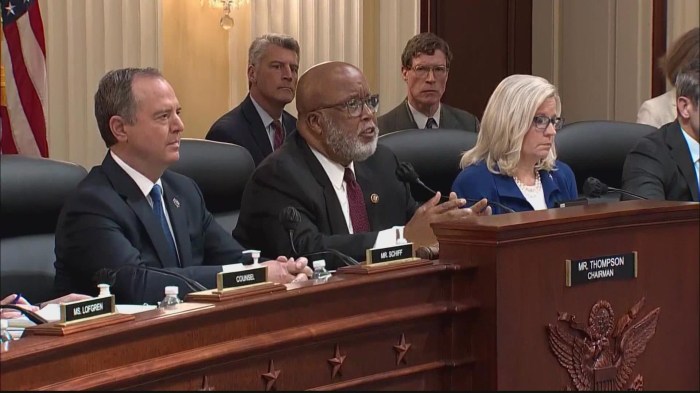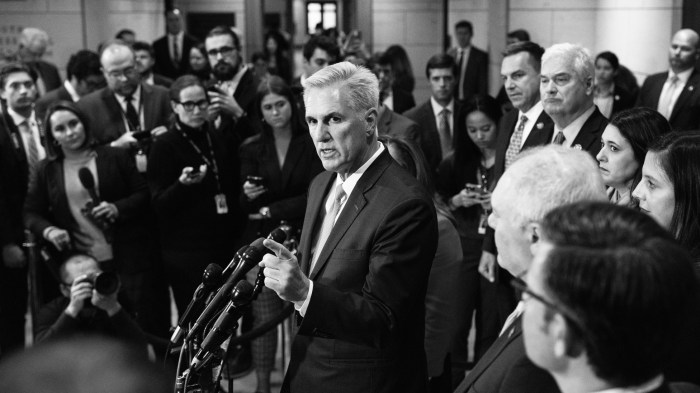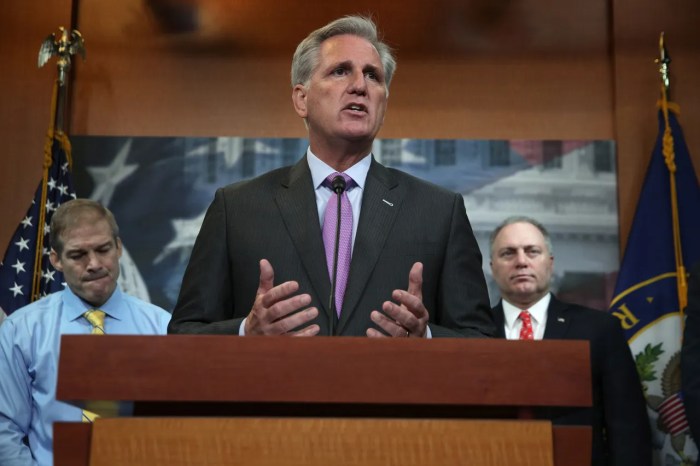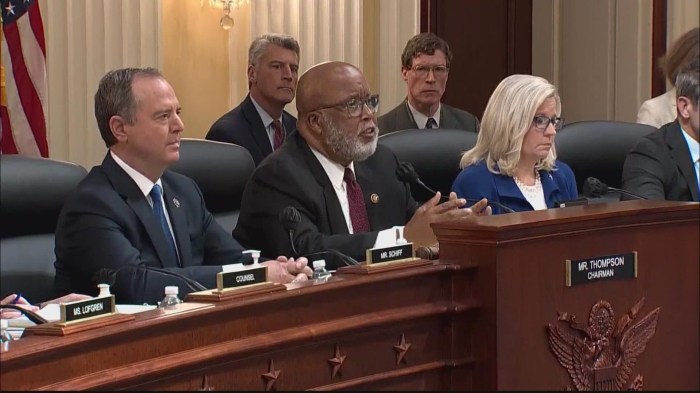
Republicans Call for Audit of US Oil Reserve Management
Republicans call for audit of US oil reserve management, a move that has ignited a fiery debate about the Strategic Petroleum Reserve (SPR) and its role in ensuring national energy security. The SPR, a massive stockpile of crude oil maintained by the U.S.
government, has been a crucial tool in mitigating energy crises, but recent releases under the Biden administration have raised concerns about its effectiveness and transparency.
Republicans argue that the SPR has been mismanaged, with releases exceeding the intended purpose of addressing temporary supply disruptions. They point to the administration’s reliance on the reserve to address geopolitical tensions and economic fluctuations, rather than true emergencies. The call for an audit seeks to shed light on the SPR’s management practices, identify potential vulnerabilities, and ensure its continued relevance in a rapidly evolving energy landscape.
Background of the Strategic Petroleum Reserve

The Strategic Petroleum Reserve (SPR) is a vital component of the United States’ energy security strategy. Established in 1975, the SPR serves as a crucial reserve of crude oil, intended to mitigate the impact of oil supply disruptions and ensure energy independence.
Purpose and History
The SPR’s establishment was driven by the 1973 oil crisis, which highlighted the vulnerability of the United States to foreign oil supply disruptions. The Energy Policy and Conservation Act of 1975 authorized the creation of the SPR, aiming to provide a readily accessible source of crude oil in the event of a national emergency.
The call for an audit of US oil reserve management comes at a time when global economic dynamics are shifting. While Republicans are scrutinizing domestic energy policies, the IMF predicts resilient economic growth for India in FY23, as outlined in this recent report.
This underscores the need for a balanced approach, considering both domestic energy security and the broader global economic landscape.
The SPR is managed by the Department of Energy (DOE), which is responsible for acquiring, storing, and releasing oil from the reserve.
Size and Composition
The SPR currently holds approximately 600 million barrels of crude oil, stored in four underground salt caverns located in Texas and Louisiana. The oil in the SPR is sourced from various domestic and international producers, ensuring a diverse portfolio. The reserve is composed primarily of sweet crude oil, which is characterized by its low sulfur content and is highly desirable for refining.
Historical Use
The SPR has been drawn upon several times throughout its history to address energy crises. Notably, the SPR was used in 1991 during the Persian Gulf War and in 2005 following Hurricane Katrina. These releases helped stabilize oil markets and mitigate price spikes caused by supply disruptions.
More recently, the SPR was used in 2022 to address the global energy crisis triggered by the Russia-Ukraine conflict. The Biden administration authorized the largest release from the SPR in history, totaling 180 million barrels.
Recent SPR Releases and Republican Concerns

The Biden administration has authorized several releases of oil from the Strategic Petroleum Reserve (SPR) since taking office in 2021, sparking significant debate and criticism from Republicans. These releases have been aimed at addressing perceived energy shortages and mitigating the impact of rising gasoline prices.
The Republicans’ call for an audit of the US oil reserve management raises questions about transparency and accountability. It’s a reminder that managing resources, whether it’s oil or personal finances, requires careful planning and discipline. Just like you might find helpful strategies for credit debt management tips strategies examples to stay on top of your finances, a thorough audit can help ensure that the US oil reserve is being managed effectively and efficiently for the benefit of the nation.
Reasons for SPR Releases
The Biden administration has cited several reasons for the SPR releases. These include:
- Addressing High Energy Prices:The administration argues that the SPR releases are necessary to combat rising gasoline prices and reduce the cost of energy for American consumers.
- Responding to Global Shortages:The releases are also intended to address global oil shortages caused by factors such as the Russian invasion of Ukraine and the ongoing COVID-19 pandemic.
- Strategic Considerations:The administration has also highlighted the importance of the SPR as a strategic asset, particularly in times of global instability and potential disruptions to energy supplies.
Republican Concerns
Republicans have expressed significant concerns about the SPR releases, arguing that they are unsustainable and counterproductive. Their concerns can be summarized as follows:
- Depleting the SPR:Republicans argue that the administration’s repeated releases are depleting the SPR, leaving the United States vulnerable to future energy crises.
- Short-Term Solution:They contend that the SPR releases are a short-term solution that does not address the underlying causes of high energy prices.
- Impact on Energy Independence:Republicans fear that the SPR releases undermine the United States’ energy independence and make the country more reliant on foreign oil producers.
- Market Distortions:Some Republicans believe that the SPR releases are distorting the market and artificially lowering gasoline prices, which could ultimately lead to higher prices in the long run.
Republican Calls for an Audit
Republican lawmakers have voiced strong concerns about the management of the Strategic Petroleum Reserve (SPR), calling for a comprehensive audit to assess its effectiveness and ensure its future viability. These concerns stem from a perceived lack of transparency and accountability in the SPR’s operations, particularly in the context of recent releases and the administration’s energy policies.
The recent calls from Republicans for an audit of the U.S. oil reserve management are raising eyebrows. While the focus is on transparency and accountability, it’s also a good time to consider the importance of data privacy, especially when dealing with sensitive information like national resources.
Understanding what is a privacy policy and why is it important can help ensure that any audit conducted is done ethically and responsibly, protecting the information while still meeting the objectives of transparency and accountability.
Republican Concerns about the SPR’s Effectiveness
Republicans argue that the SPR’s recent releases have been ineffective in lowering gasoline prices and have instead exacerbated inflationary pressures. They point to the fact that the Biden administration has drawn down the SPR to historic lows, while gasoline prices remain stubbornly high.
“The Biden administration has been using the SPR as a political tool to try to lower gas prices, but it’s not working. The SPR is meant to be a strategic reserve, not a political tool,”
said Republican Senator John Barrasso of Wyoming. Republicans also express concerns about the SPR’s ability to meet future energy demands. They argue that the SPR’s current inventory is insufficient to meet the needs of a growing economy and a potential energy crisis.
Potential Benefits of an Audit
An audit of the SPR’s management could provide valuable insights into its effectiveness and identify areas for improvement. It could also help to restore public confidence in the SPR and ensure its long-term viability.Republicans argue that an audit would:
- Provide a clear and independent assessment of the SPR’s current state and its ability to meet future energy demands.
- Identify any potential weaknesses in the SPR’s management and recommend solutions to address them.
- Enhance transparency and accountability in the SPR’s operations.
- Provide a framework for future SPR management decisions.
Republicans believe that an audit is essential to ensure that the SPR remains a vital strategic asset for the United States.
Potential Issues with SPR Management: Republicans Call For Audit Of Us Oil Reserve Management
The Strategic Petroleum Reserve (SPR) is a vital national asset designed to mitigate energy supply disruptions. However, concerns have been raised about the effectiveness and security of the SPR’s management. This section will delve into potential vulnerabilities in the SPR’s infrastructure and security, potential conflicts of interest in its management, and analyze the effectiveness of the SPR in addressing energy emergencies.
Infrastructure and Security Vulnerabilities
The SPR’s infrastructure, including its storage caverns and pipelines, is susceptible to various threats.
- Natural Disasters:Hurricanes, earthquakes, and floods could damage SPR facilities, disrupting storage and distribution operations. The 2005 Hurricane Katrina event highlighted the vulnerability of the SPR’s infrastructure to natural disasters. The storm caused significant damage to SPR facilities in Louisiana, impacting the reserve’s ability to respond to energy emergencies.
- Cyberattacks:The SPR’s computer systems and control infrastructure are potential targets for cyberattacks. Malicious actors could disrupt SPR operations by compromising control systems or stealing sensitive data. A cyberattack on the SPR could significantly impact the nation’s energy security.
- Terrorist Attacks:Terrorist attacks targeting SPR facilities could disrupt operations and create a major energy crisis. The SPR’s vast storage facilities and infrastructure make them potential targets for terrorist groups.
Conflicts of Interest in SPR Management
Concerns have been raised about potential conflicts of interest in the management of the SPR.
- Industry Influence:The SPR’s management has been criticized for being too influenced by the oil and gas industry. Some argue that the SPR has been used to benefit oil companies at the expense of consumers. For instance, some critics have argued that the SPR has been used to suppress oil prices by releasing oil into the market when prices are high.
- Political Pressure:Political pressure from oil-producing states or from members of Congress with ties to the oil industry could influence SPR management decisions.
Effectiveness of the SPR in Addressing Energy Emergencies
The SPR’s effectiveness in addressing energy emergencies has been a subject of debate.
- Limited Capacity:The SPR’s current capacity is limited, and some argue that it is not sufficient to meet the needs of a major energy crisis. The SPR holds approximately 600 million barrels of oil, which is less than a month’s worth of U.S.
oil consumption.
- Response Time:The time it takes to release oil from the SPR and deliver it to market can be significant. The SPR’s release process involves multiple steps, including approval from the Department of Energy, contracting with oil companies, and transporting the oil to refineries.
This process can take several weeks or even months, which may not be sufficient to address a sudden energy crisis.
- Market Impact:The impact of SPR releases on oil prices can be unpredictable. Some argue that SPR releases can actually increase oil prices by creating a sense of scarcity in the market. For example, the SPR release in 2011 was intended to lower gasoline prices, but the price of oil actually rose in the weeks following the release.
Alternatives to SPR Management

The Strategic Petroleum Reserve (SPR) has been a cornerstone of U.S. energy security for decades, but recent events have raised questions about its effectiveness and the need for alternative strategies. This section explores potential alternative approaches to managing the SPR, compares their effectiveness, and discusses the potential implications of different management strategies.
Alternative Management Strategies
The current SPR management approach, focused on releasing oil in times of emergency, has been criticized for its slow response time and lack of flexibility. Alternatives to the current SPR management approach include:
- Increased Private Sector Involvement: Encouraging private sector investment in oil storage and distribution infrastructure could enhance the nation’s oil supply chain resilience. This approach would allow for faster and more flexible responses to supply disruptions, potentially reducing reliance on the SPR.
- Strategic Oil Stockpiles in Multiple Locations: Instead of concentrating the SPR in a few large, centralized facilities, distributing stockpiles across multiple locations could improve accessibility and reduce the risk of a single attack or natural disaster disrupting the entire reserve. This approach could also potentially facilitate faster response times during emergencies.
- Focus on Energy Efficiency and Renewable Energy: Investing in energy efficiency and renewable energy sources can reduce the overall demand for oil, lessening the need for large-scale oil reserves. This strategy could contribute to a more sustainable and less volatile energy system, potentially mitigating the need for a massive oil reserve.
- International Cooperation on Oil Stockpiles: Collaborating with international partners to establish coordinated oil stockpiles could enhance global energy security. This approach could provide access to a larger pool of resources and facilitate more effective responses to global supply disruptions.
Future of the SPR
The proposed audit of the Strategic Petroleum Reserve (SPR) could have a significant impact on its future. The audit’s findings could lead to changes in how the SPR is managed, potentially impacting its effectiveness and role in future energy crises.
Potential Impact of the Audit
The audit’s findings could influence future SPR management decisions in several ways. For instance, if the audit reveals inefficiencies or mismanagement, it could lead to:
- Changes in SPR Management Practices:The audit could lead to new regulations or guidelines for managing the SPR, aiming to improve efficiency and effectiveness.
- Increased Transparency and Accountability:The audit might push for greater transparency in SPR operations, making information about its use and management more readily available to the public.
- Enhanced Security Measures:The audit could highlight security vulnerabilities and lead to stricter measures to protect the SPR from potential threats.
Potential Legislative Changes, Republicans call for audit of us oil reserve management
The audit’s findings could also prompt legislative changes regarding SPR management. Potential changes include:
- Changes in Release Authority:The audit could lead to discussions about changing the authority responsible for releasing SPR oil, perhaps moving it to a different agency or establishing a new body.
- Increased Funding for SPR Maintenance:The audit could highlight the need for increased funding to maintain and modernize the SPR infrastructure.
- New SPR Release Criteria:The audit could lead to the development of new criteria for determining when and how SPR oil is released, potentially including more specific triggers based on market conditions or geopolitical events.
Role of the SPR in Future Energy Crises
The SPR’s role in future energy crises is likely to be influenced by the audit’s findings and any subsequent changes in management. The SPR’s effectiveness in mitigating future energy crises will depend on several factors, including:
- SPR Size and Capacity:The SPR’s effectiveness will be influenced by its size and capacity. A larger SPR could provide a more significant buffer against supply disruptions.
- SPR Accessibility and Release Mechanisms:The SPR’s effectiveness will also depend on its accessibility and the speed and efficiency of its release mechanisms.
- Global Energy Markets:The SPR’s effectiveness in future crises will also be influenced by the global energy market landscape. In a highly integrated global energy market, SPR releases may have a limited impact on global prices.

